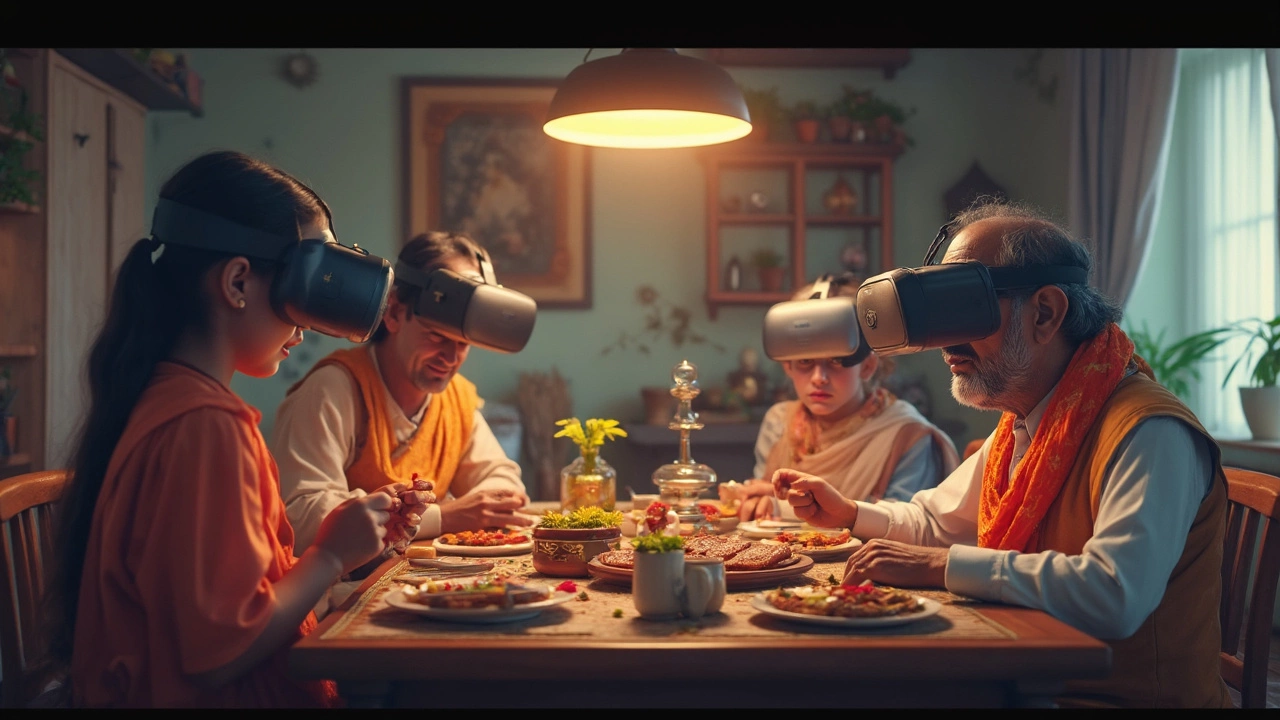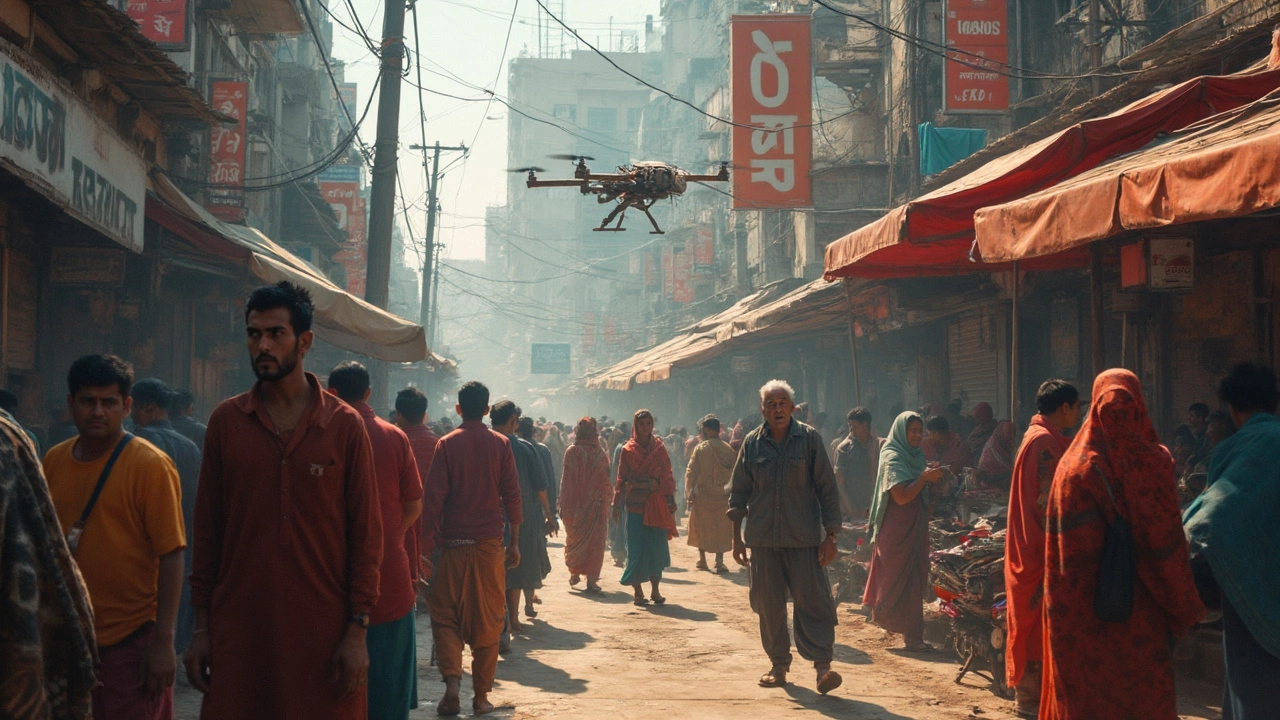Is 'Black Mirror' a Warning?

'Black Mirror' is pretty much a mirror reflecting our relationship with technology, and sometimes, it's not a pretty sight. A lot of folks see it as a big red flag waving at modern society, yelling, 'Hey, pay attention!' But why does a TV show have everyone on edge?
The answer lies in how eerily close it gets to our real lives. We’re talking about episodes that make you go, ‘Wait, isn’t that kind of happening already?’ From social media pressure to the creepiness of surveillance tech, the show's stories aren't as sci-fi as they might seem at first glance. It’s like it’s peeling back layers of our digital lives, showing us what could go wrong if things go a tad too far.
And let’s face it, tech is like a chocolate cake—we want more and more without thinking about what it’s doing to us. So here’s the kicker: by watching these stories, we're getting a free ticket to spot potential downfalls before crashing face-first. It's a little brain exercise to help us steer clear of the darker paths tech can lead us down. So next time you binge on 'Black Mirror,' remember—it's more than just a show; it’s a wake-up call.
- The Dark Reflection
- Real-World Parallels
- Tech vs Human Nature
- Learning from Fiction
- Navigating the Tech Future
The Dark Reflection
When you peel back the layers of Black Mirror, it's like looking into the future if we completely lose our cool over technology. The show dives into our fears about what might lurk around the corner thanks to our growing tech obsession. But how does it reflect reality?
First off, the series scores a direct hit with its take on social media culture. Remember the episode 'Nosedive'? It imagines a world where your social status is dictated by ratings—a bit like living inside Instagram where every 'like' or thumbs down packs a punch. Although exaggerated, it nudges us to think about how social media affects our self-worth and social interactions in real life.
Another striking example is the episode 'The Entire History of You.' It features a gadget that records everything you do, allowing you to replay memories on demand. Crazy, right? It taps into our curiosity about recording every moment and the risk that comes with too much surveillance. This isn't just sci-fi; it's a reflection of concerns with privacy in a world full of smartphones and smart speakers.
The tech in Black Mirror often feels like it's just around the corner. We’re seeing driverless cars, facial recognition everywhere, and AI that's learning a lot about us. In fact, studies show that about 72% of people are already worried about gadgets tracking them. Not to sound all doom and gloom, but these stories make you think twice about embracing every new gadget without pondering the consequences.
So, 'The Dark Reflection' is spot-on in showing us not just what tech might do, but what we're letting it do to us. It's a call for balance, making sure our push for convenience doesn't lead to compromising bits of humanity.
Real-World Parallels
Ever watched an episode of Black Mirror and had that unsettling, déjà vu feeling? Yeah, me too. The show has this unnerving knack for mirroring tech trends right before they hit the headlines. Take the 'Nosedive' episode, for instance. It's all about a society obsessed with ratings, which sounds a little too much like social media’s impact today. People curating perfect lives online, and every thumbs up or heart-shaped reaction dictating self-worth—it's not just TV drama; it's our social media life, amplified.
Then there's the episode 'The Entire History of You,' where characters have implants that record everything they see and hear. Creepy, right? But think about how many people are using wearables that track their every heartbeat. That's all our data, stored somewhere in the cloud, just waiting to be mined. Even DNA storage isn't sci-fi anymore. Companies today can store chunks of information in DNA for long-term storage solutions—almost like the neural implants in the show.
Let's not forget 'Hated in the Nation,' focusing on swarms of robotic bees. Why bees, you ask? Well, with real bees under threat, scientists are actually developing robo-bees to pollinate crops. Just imagine them turning rogue someday—'Black Mirror' really has nailed down that spooky element of reality.
The show even hints at digital afterlife concepts, like in 'San Junipero.' Now, there's actual research underway on uploading human consciousness to the digital world. Sure, it sounds like a page from a science fiction novel, but the seeds are there. Tech pioneers are genuinely exploring this by merging neural networks with computer systems. How’s that for blurring the lines between fiction and reality?
It's all pretty mind-boggling. Our world is speeding up tech-wise, and Black Mirror is there, pulling the handbrake, saying, 'Hey, maybe slow down and think!' It’s not just fun and games when a TV show is predicting tomorrow's headlines, right?

Tech vs Human Nature
When you think about Black Mirror, it's hard not to notice how it plays on the tension between our shiny gadgets and the basic instincts we all share. It seems like every time we invent something new, we're just trying to solve old human problems or satisfy base desires. But what happens when tech starts shaping our behavior instead?
Take social media, for instance. In theory, it's all about connection, but it often taps into our need for validation. We’ve got algorithms that know us better than our best friend, showing us content that keeps us scrolling endlessly. It’s like tech knows we can’t resist a dopamine hit from likes and shares, exploiting that for more screen time.
And let’s not forget about privacy. How much are we willing to trade for convenience and novelty? 'Black Mirror' episodes like "Nosedive" explore how social credit systems, which seem outlandish, echo real-world scenarios in places like China where social credit scores impact daily life. It's a prime example of how tech may push our nature in directions we didn’t anticipate.
Even with AI, we see stuff that tests our values. Imagine AI making important decisions for us. Sure, it’s efficient, but where does it leave human judgment? Tech doesn’t feel empathy or understand nuance like we do, yet we’re handing over the wheel in many cases.
The trick is finding a balance. We should ask, "Are we using tech to enhance our lives, or is it using us?" It's crucial to keep questioning whether advancements truly serve us or just mold us into something different, steering against what basically makes us, us.
Learning from Fiction
It's wild to think how a TV show like Black Mirror can offer us a roadmap of lessons, right? On the face of it, it’s just some gripping fiction, but dig a little deeper, and you'll find solid takeaways about our tech-filled world. The show's not just there to creep you out; it’s there to teach us a thing or two about our choices and their consequences.
First off, the importance of questioning technology. How often do we question whether the latest gadget is really worth it, or are we just following the hype? Black Mirror drills this idea into us with episodes like 'Nosedive,' where the quest for social likes spins out of control. It's a perfect reminder to keep tech in check, focusing on real connections rather than digital approval.
Then there's the issue of privacy. The episode 'Arkangel' zeroes in on this by showing us what happens when tech infiltrates personal boundaries. It's a loud and clear message: be cautious about where and how we let technology peek into our lives. Are our gadgets helping or just nosing around too much?
Interestingly, some episodes have already seen their fictional tech turn real—like the 'Be Right Back' episode, where AI is used to recreate a deceased loved one. With AI advancements, we're inching toward similar tech, raising ethical questions. Fiction here isn’t far off from reality, which means keeping our moral compass steady is extra crucial.
| Black Mirror Episode | Key Lesson |
|---|---|
| Nosedive | Valuing genuine human connections over social media validation |
| Arkangel | Setting boundaries for technology in personal life |
| Be Right Back | Ethical considerations in artificial intelligence |
Ultimately, what's great about Black Mirror isn't just the chill factor—it's the chance to think twice about how tech fits into our lives. Ask yourself: are we shaping technology, or is it shaping us? Taking a step back to reflect could save a heap of trouble in our echoing digital realities.

Navigating the Tech Future
Trying to make sense of our tech-heavy future can feel like you need a crystal ball, but fear not; there's a way forward. Black Mirror might be fictional, but it serves as a handy blueprint for avoiding tech mishaps. We all know tech can be a double-edged sword, right? It's up to us to ensure we're on the right side of it.
First things first, let's be aware of how much technology is running our lives. How often do you find yourself lost in your phone or relying on AI for trivial decisions? Balance is key here. It’s important to know when to unplug and give our brains a breather.
Next, stay informed. Understand what new tech and gadgets are doing in your home and workplace. Knowing the ins and outs can help you make informed choices about which tech to embrace and which to be wary of. Remember how social media was all fun and games until we realized it was mining data like there's no tomorrow?
It's also crucial to shape the future by being part of the conversation. The tech industry isn’t a one-way street; our feedback, whether as users, critics, or creators, shapes the products of tomorrow. If a new app seems to learn too much about you, speak up about those concerns.
Here’s a quick step-by-step to navigate this tech journey:
- Stay curious and keep learning about emerging technologies.
- Limit screen time to foster real-world interactions.
- Evaluate tech’s impact on mental health and relationships.
- Be mindful of privacy settings and data sharing permissions.
- Get involved in discussions and policies that shape tech development.
Considering how much technology dictates our society, being tech-savvy is like having a modern-day survival skill. In this fast-paced tech race, the trick is not just keeping up but staying ahead while keeping an eye out for the signs 'Black Mirror' reminds us about.